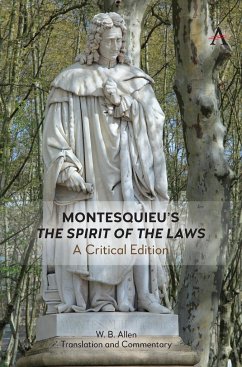Montesquieu's 'The Spirit of the Laws'
A Critical Edition
Montesquieu's 'The Spirit of the Laws'
A Critical Edition
- Gebundenes Buch
- Merkliste
- Auf die Merkliste
- Bewerten Bewerten
- Teilen
- Produkt teilen
- Produkterinnerung
- Produkterinnerung
The Spirit of the Laws is the canonical text of modern republicanism and the English translation â always deficient heretofore â is critical to an appreciation of those deliberations that led to adoption of the Constitution of the United States. The present update recovers the sense of the original French.
Andere Kunden interessierten sich auch für
![Apphia Peach, George Lord Lyttelton, and 'The Correspondents' Apphia Peach, George Lord Lyttelton, and 'The Correspondents']() Melvyn NewApphia Peach, George Lord Lyttelton, and 'The Correspondents'132,99 €
Melvyn NewApphia Peach, George Lord Lyttelton, and 'The Correspondents'132,99 €![The Book of Tribulations: The Syrian Muslim Apocalyptic Tradition The Book of Tribulations: The Syrian Muslim Apocalyptic Tradition]() Nu'aym b. Hammad al-MarwaziThe Book of Tribulations: The Syrian Muslim Apocalyptic Tradition40,99 €
Nu'aym b. Hammad al-MarwaziThe Book of Tribulations: The Syrian Muslim Apocalyptic Tradition40,99 €![Sir John Fortescue's 'The Cruelest Necessity': The British Army, the English Civil War and the Conflicts of the 17th Century Sir John Fortescue's 'The Cruelest Necessity': The British Army, the English Civil War and the Conflicts of the 17th Century]() Fortescue, J W, SirSir John Fortescue's 'The Cruelest Necessity': The British Army, the English Civil War and the Conflicts of the 17th Century30,99 €
Fortescue, J W, SirSir John Fortescue's 'The Cruelest Necessity': The British Army, the English Civil War and the Conflicts of the 17th Century30,99 €![The Companion to 'The Mystery of Edwin Drood' The Companion to 'The Mystery of Edwin Drood']() Wendy S. JacobsonThe Companion to 'The Mystery of Edwin Drood'51,99 €
Wendy S. JacobsonThe Companion to 'The Mystery of Edwin Drood'51,99 €![The Collected Supernatural and Weird Fiction of W. W. Jacobs: Twenty-One Short Stories of the Strange and Unusual including 'The Monkey's Paw', 'The B The Collected Supernatural and Weird Fiction of W. W. Jacobs: Twenty-One Short Stories of the Strange and Unusual including 'The Monkey's Paw', 'The B]() W W JacobsThe Collected Supernatural and Weird Fiction of W. W. Jacobs: Twenty-One Short Stories of the Strange and Unusual including 'The Monkey's Paw', 'The B31,99 €
W W JacobsThe Collected Supernatural and Weird Fiction of W. W. Jacobs: Twenty-One Short Stories of the Strange and Unusual including 'The Monkey's Paw', 'The B31,99 €![The Collected Supernatural and Weird Fiction of Amelia B. Edwards: Contains Two Novelettes 'Monsieur Maurice' and 'The Discovery of the Treasure Isles The Collected Supernatural and Weird Fiction of Amelia B. Edwards: Contains Two Novelettes 'Monsieur Maurice' and 'The Discovery of the Treasure Isles]() Professor Amelia B EdwardsThe Collected Supernatural and Weird Fiction of Amelia B. Edwards: Contains Two Novelettes 'Monsieur Maurice' and 'The Discovery of the Treasure Isles41,99 €
Professor Amelia B EdwardsThe Collected Supernatural and Weird Fiction of Amelia B. Edwards: Contains Two Novelettes 'Monsieur Maurice' and 'The Discovery of the Treasure Isles41,99 €![Anniversary Essays on Alexander Pope's 'The Rape of the Lock' Anniversary Essays on Alexander Pope's 'The Rape of the Lock']() Anniversary Essays on Alexander Pope's 'The Rape of the Lock'89,99 €
Anniversary Essays on Alexander Pope's 'The Rape of the Lock'89,99 €-
-
-
The Spirit of the Laws is the canonical text of modern republicanism and the English translation â always deficient heretofore â is critical to an appreciation of those deliberations that led to adoption of the Constitution of the United States. The present update recovers the sense of the original French.
Hinweis: Dieser Artikel kann nur an eine deutsche Lieferadresse ausgeliefert werden.
Hinweis: Dieser Artikel kann nur an eine deutsche Lieferadresse ausgeliefert werden.
Produktdetails
- Produktdetails
- Verlag: Anthem Press
- Seitenzahl: 984
- Erscheinungstermin: 6. Februar 2024
- Englisch
- Abmessung: 250mm x 175mm x 57mm
- Gewicht: 1866g
- ISBN-13: 9781839982941
- ISBN-10: 1839982942
- Artikelnr.: 62269187
- Herstellerkennzeichnung
- Libri GmbH
- Europaallee 1
- 36244 Bad Hersfeld
- gpsr@libri.de
- Verlag: Anthem Press
- Seitenzahl: 984
- Erscheinungstermin: 6. Februar 2024
- Englisch
- Abmessung: 250mm x 175mm x 57mm
- Gewicht: 1866g
- ISBN-13: 9781839982941
- ISBN-10: 1839982942
- Artikelnr.: 62269187
- Herstellerkennzeichnung
- Libri GmbH
- Europaallee 1
- 36244 Bad Hersfeld
- gpsr@libri.de
W. B. Allen studies and writes broadly in political philosophy and history, with special focus on traditions of self-government and liberalism.
Acknowledgments; Translator's Preface; Foreword; THE SPIRIT OF THE LAWS BY
MONTESQUIEU Concerning the Spirit of the Laws; PART ONE, Book One
Concerning Laws in General; Book Two Concerning the Laws Which Derive
Directly from the Nature of the Government; Book Three Concerning the
Principles of the Three Governments; Book Four That Education Laws Ought to
Be Relative to the Principles of the Government; Book Five The Legislator's
Laws Must Be Relative to the Principle of the Government; Book Six
Consequences of the Principles of Different Governments, in Relation to the
Simplicity of Civil and Criminal Laws, the Method of Judgment, and the
Establishment of Penalties; Book Seven Consequences of the Differing
Principles of the Three Governments, in Relation to Sumptuary Laws, Luxury,
and the Status of Women; Book Eight Concerning the Corruption of the
Principles of the Three Governments; PART TWO, Book Nine Concerning the
Laws in the Relation They Have with Defensive Strength; Book Ten Concerning
the Laws in Their Relation to Offensive Force; Book Eleven About Laws Which
Create Political Liberty, in Its Relation to the Constitution; Book Twelve
About the Laws Which Create Political Liberty, in Its Relation to the
Citizen; Book Thirteen About the Relations Which the Levying of Taxes and
the Extent of Public Revenues Hold with Liberty; PART THREE, Book Fourteen
Concerning the Laws, in the Relation They Have with the Climate's Nature;
Book Fifteen How the Laws of Civil Slavery Have Some Relation to the Nature
of the Climate; Book Sixteen How the Laws of Domestic Slavery Have Some
Relation to the Nature of the Climate; Book Seventeen How the Laws of
Political Servitude Are Related to the Nature of the Climate; Book Eighteen
Concerning the Laws, in the Relation Which They Have to the Nature of the
Terrain; Book Nineteen Concerning the Laws in the Relation Which They Have
with the Principles That Create the General Spirit, the Morals, and the
Manners of a Nation ; PART FOUR, Book Twenty About the Laws in the Relation
That They Have with Commerce, Considered in Its Nature and Its
Distinctions; Book Twenty-One About the Laws in the Relation They Have with
Commerce, Considered Under the Revolutions Which There Have Been in the
World; Book Twenty-Two About the Laws in the Relation That They Have with
the Use of Money; Book Twenty-Three About the Laws in the Relation Which
They Have to the Number of Inhabitants; PART FIVE, Book Twenty-Four
Concerning the Laws in the Relation Which They Have to the Religion
Instituted in Each Country, Considered in Its Practices and in Itself; Book
Twenty-Five Laws in Relation to the Religion of Each Country and Its
External Politics; Book Twenty-Six Concerning the Laws in the Relation That
They Have with the Arrangement of Matters over Which They Are Set Up; PART
SIX, Book Twenty-Seven Concerning the Origin and Revolutions of the Roman
Laws on Successions; Book Twenty-Eight Concerning the Origin and
Revolutions of the Civil Laws Among the French; Book Twenty-Nine About the
Manner of Composing the Laws; Book Thirty A Theory of Feudal Laws Among the
Francs in the Relation That They Have with Instituting the Monarchy; Book
Thirty-One A Theory of Feudal Laws Among the Franks, in the Relation That
They Have with the Revolutions in Their Monarchy; THE MIND BEHIND THE LAWS:
THE TRANSLATION OF POWER; Epilogue: Montesquieu and America; Notes;
Bibliography
MONTESQUIEU Concerning the Spirit of the Laws; PART ONE, Book One
Concerning Laws in General; Book Two Concerning the Laws Which Derive
Directly from the Nature of the Government; Book Three Concerning the
Principles of the Three Governments; Book Four That Education Laws Ought to
Be Relative to the Principles of the Government; Book Five The Legislator's
Laws Must Be Relative to the Principle of the Government; Book Six
Consequences of the Principles of Different Governments, in Relation to the
Simplicity of Civil and Criminal Laws, the Method of Judgment, and the
Establishment of Penalties; Book Seven Consequences of the Differing
Principles of the Three Governments, in Relation to Sumptuary Laws, Luxury,
and the Status of Women; Book Eight Concerning the Corruption of the
Principles of the Three Governments; PART TWO, Book Nine Concerning the
Laws in the Relation They Have with Defensive Strength; Book Ten Concerning
the Laws in Their Relation to Offensive Force; Book Eleven About Laws Which
Create Political Liberty, in Its Relation to the Constitution; Book Twelve
About the Laws Which Create Political Liberty, in Its Relation to the
Citizen; Book Thirteen About the Relations Which the Levying of Taxes and
the Extent of Public Revenues Hold with Liberty; PART THREE, Book Fourteen
Concerning the Laws, in the Relation They Have with the Climate's Nature;
Book Fifteen How the Laws of Civil Slavery Have Some Relation to the Nature
of the Climate; Book Sixteen How the Laws of Domestic Slavery Have Some
Relation to the Nature of the Climate; Book Seventeen How the Laws of
Political Servitude Are Related to the Nature of the Climate; Book Eighteen
Concerning the Laws, in the Relation Which They Have to the Nature of the
Terrain; Book Nineteen Concerning the Laws in the Relation Which They Have
with the Principles That Create the General Spirit, the Morals, and the
Manners of a Nation ; PART FOUR, Book Twenty About the Laws in the Relation
That They Have with Commerce, Considered in Its Nature and Its
Distinctions; Book Twenty-One About the Laws in the Relation They Have with
Commerce, Considered Under the Revolutions Which There Have Been in the
World; Book Twenty-Two About the Laws in the Relation That They Have with
the Use of Money; Book Twenty-Three About the Laws in the Relation Which
They Have to the Number of Inhabitants; PART FIVE, Book Twenty-Four
Concerning the Laws in the Relation Which They Have to the Religion
Instituted in Each Country, Considered in Its Practices and in Itself; Book
Twenty-Five Laws in Relation to the Religion of Each Country and Its
External Politics; Book Twenty-Six Concerning the Laws in the Relation That
They Have with the Arrangement of Matters over Which They Are Set Up; PART
SIX, Book Twenty-Seven Concerning the Origin and Revolutions of the Roman
Laws on Successions; Book Twenty-Eight Concerning the Origin and
Revolutions of the Civil Laws Among the French; Book Twenty-Nine About the
Manner of Composing the Laws; Book Thirty A Theory of Feudal Laws Among the
Francs in the Relation That They Have with Instituting the Monarchy; Book
Thirty-One A Theory of Feudal Laws Among the Franks, in the Relation That
They Have with the Revolutions in Their Monarchy; THE MIND BEHIND THE LAWS:
THE TRANSLATION OF POWER; Epilogue: Montesquieu and America; Notes;
Bibliography
Acknowledgments; Translator's Preface; Foreword; THE SPIRIT OF THE LAWS BY
MONTESQUIEU Concerning the Spirit of the Laws; PART ONE, Book One
Concerning Laws in General; Book Two Concerning the Laws Which Derive
Directly from the Nature of the Government; Book Three Concerning the
Principles of the Three Governments; Book Four That Education Laws Ought to
Be Relative to the Principles of the Government; Book Five The Legislator's
Laws Must Be Relative to the Principle of the Government; Book Six
Consequences of the Principles of Different Governments, in Relation to the
Simplicity of Civil and Criminal Laws, the Method of Judgment, and the
Establishment of Penalties; Book Seven Consequences of the Differing
Principles of the Three Governments, in Relation to Sumptuary Laws, Luxury,
and the Status of Women; Book Eight Concerning the Corruption of the
Principles of the Three Governments; PART TWO, Book Nine Concerning the
Laws in the Relation They Have with Defensive Strength; Book Ten Concerning
the Laws in Their Relation to Offensive Force; Book Eleven About Laws Which
Create Political Liberty, in Its Relation to the Constitution; Book Twelve
About the Laws Which Create Political Liberty, in Its Relation to the
Citizen; Book Thirteen About the Relations Which the Levying of Taxes and
the Extent of Public Revenues Hold with Liberty; PART THREE, Book Fourteen
Concerning the Laws, in the Relation They Have with the Climate's Nature;
Book Fifteen How the Laws of Civil Slavery Have Some Relation to the Nature
of the Climate; Book Sixteen How the Laws of Domestic Slavery Have Some
Relation to the Nature of the Climate; Book Seventeen How the Laws of
Political Servitude Are Related to the Nature of the Climate; Book Eighteen
Concerning the Laws, in the Relation Which They Have to the Nature of the
Terrain; Book Nineteen Concerning the Laws in the Relation Which They Have
with the Principles That Create the General Spirit, the Morals, and the
Manners of a Nation ; PART FOUR, Book Twenty About the Laws in the Relation
That They Have with Commerce, Considered in Its Nature and Its
Distinctions; Book Twenty-One About the Laws in the Relation They Have with
Commerce, Considered Under the Revolutions Which There Have Been in the
World; Book Twenty-Two About the Laws in the Relation That They Have with
the Use of Money; Book Twenty-Three About the Laws in the Relation Which
They Have to the Number of Inhabitants; PART FIVE, Book Twenty-Four
Concerning the Laws in the Relation Which They Have to the Religion
Instituted in Each Country, Considered in Its Practices and in Itself; Book
Twenty-Five Laws in Relation to the Religion of Each Country and Its
External Politics; Book Twenty-Six Concerning the Laws in the Relation That
They Have with the Arrangement of Matters over Which They Are Set Up; PART
SIX, Book Twenty-Seven Concerning the Origin and Revolutions of the Roman
Laws on Successions; Book Twenty-Eight Concerning the Origin and
Revolutions of the Civil Laws Among the French; Book Twenty-Nine About the
Manner of Composing the Laws; Book Thirty A Theory of Feudal Laws Among the
Francs in the Relation That They Have with Instituting the Monarchy; Book
Thirty-One A Theory of Feudal Laws Among the Franks, in the Relation That
They Have with the Revolutions in Their Monarchy; THE MIND BEHIND THE LAWS:
THE TRANSLATION OF POWER; Epilogue: Montesquieu and America; Notes;
Bibliography
MONTESQUIEU Concerning the Spirit of the Laws; PART ONE, Book One
Concerning Laws in General; Book Two Concerning the Laws Which Derive
Directly from the Nature of the Government; Book Three Concerning the
Principles of the Three Governments; Book Four That Education Laws Ought to
Be Relative to the Principles of the Government; Book Five The Legislator's
Laws Must Be Relative to the Principle of the Government; Book Six
Consequences of the Principles of Different Governments, in Relation to the
Simplicity of Civil and Criminal Laws, the Method of Judgment, and the
Establishment of Penalties; Book Seven Consequences of the Differing
Principles of the Three Governments, in Relation to Sumptuary Laws, Luxury,
and the Status of Women; Book Eight Concerning the Corruption of the
Principles of the Three Governments; PART TWO, Book Nine Concerning the
Laws in the Relation They Have with Defensive Strength; Book Ten Concerning
the Laws in Their Relation to Offensive Force; Book Eleven About Laws Which
Create Political Liberty, in Its Relation to the Constitution; Book Twelve
About the Laws Which Create Political Liberty, in Its Relation to the
Citizen; Book Thirteen About the Relations Which the Levying of Taxes and
the Extent of Public Revenues Hold with Liberty; PART THREE, Book Fourteen
Concerning the Laws, in the Relation They Have with the Climate's Nature;
Book Fifteen How the Laws of Civil Slavery Have Some Relation to the Nature
of the Climate; Book Sixteen How the Laws of Domestic Slavery Have Some
Relation to the Nature of the Climate; Book Seventeen How the Laws of
Political Servitude Are Related to the Nature of the Climate; Book Eighteen
Concerning the Laws, in the Relation Which They Have to the Nature of the
Terrain; Book Nineteen Concerning the Laws in the Relation Which They Have
with the Principles That Create the General Spirit, the Morals, and the
Manners of a Nation ; PART FOUR, Book Twenty About the Laws in the Relation
That They Have with Commerce, Considered in Its Nature and Its
Distinctions; Book Twenty-One About the Laws in the Relation They Have with
Commerce, Considered Under the Revolutions Which There Have Been in the
World; Book Twenty-Two About the Laws in the Relation That They Have with
the Use of Money; Book Twenty-Three About the Laws in the Relation Which
They Have to the Number of Inhabitants; PART FIVE, Book Twenty-Four
Concerning the Laws in the Relation Which They Have to the Religion
Instituted in Each Country, Considered in Its Practices and in Itself; Book
Twenty-Five Laws in Relation to the Religion of Each Country and Its
External Politics; Book Twenty-Six Concerning the Laws in the Relation That
They Have with the Arrangement of Matters over Which They Are Set Up; PART
SIX, Book Twenty-Seven Concerning the Origin and Revolutions of the Roman
Laws on Successions; Book Twenty-Eight Concerning the Origin and
Revolutions of the Civil Laws Among the French; Book Twenty-Nine About the
Manner of Composing the Laws; Book Thirty A Theory of Feudal Laws Among the
Francs in the Relation That They Have with Instituting the Monarchy; Book
Thirty-One A Theory of Feudal Laws Among the Franks, in the Relation That
They Have with the Revolutions in Their Monarchy; THE MIND BEHIND THE LAWS:
THE TRANSLATION OF POWER; Epilogue: Montesquieu and America; Notes;
Bibliography








